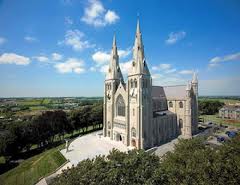With its Celtic roots, the primary religion in early Ireland was Druid. However, invasions brought Christianity to Ireland by the early 5th century and it was spread through the works of early missionaries such as Palladius and Saint Patrick. Still the most dominant religion today, the Catholic Church claims over 47% of the population with the Anglican church in second position. However the numbers show a disturbing trend. Once a bastion of Catholicism, Ireland has lost is way in the eyes of the church as those who claim to be Catholic fell from 67% in 2005 to 45% today, the fastest drop in the world, excluding Communist Vietnam. It is ironic that the country which originated Saint Patrick's Day is rapidly becoming non-catholic. Perhaps the snakes will return?
The reasons for this change run deep in Ireland's history and have been amplified by recent sex crimes in the modern church. After the defeat of King James II of England in 1690, laws were introduced which discriminated against Roman Catholics and by 1829 the Catholic Emancipation loosened the restrictions imposed by the church. During this time the Anglican Church of England grew in importance.
Recently, the outrage over the Church's handling of claims of sexual abuse against children boiled over and lead to Ireland’s Prime Minister, Enda Kenny, indicting the Vatican as he charged, "the rape and torture of children were downplayed in favor of upholding the primacy of the institution, its power, standing and reputation."
Weather
 Ireland has a mild, temperate climate with a mean annual temperature of around 50°F. Rain showers can occur at any time of the year and any time of day, after all, that's how it got the nick name, "The Emerald Isle." The light rains and misty mountains create a sense of magic throughout the countryside. The magic that has led to legends of fairies, leprechauns, and magical pots of gold.
Ireland has a mild, temperate climate with a mean annual temperature of around 50°F. Rain showers can occur at any time of the year and any time of day, after all, that's how it got the nick name, "The Emerald Isle." The light rains and misty mountains create a sense of magic throughout the countryside. The magic that has led to legends of fairies, leprechauns, and magical pots of gold. June through August is the driest time of the year with warmer, longer days, making this a great time to visit. The southeast is the driest area. The summer is also peak tourist season and most of the yearly festivals occur during this time, attracting large crowds of visitors. Spring and autumn are pleasant, but you will need to be prepared for surprise light showers. Winter days are grey and gloomy with low temperatures, but not freezing. Ireland seldom gets freezing weather or snow. Snow is scarce in Ireland and the temperature rarely drops below freezing, however there is less sunlight during this time of the year.

No comments:
Post a Comment